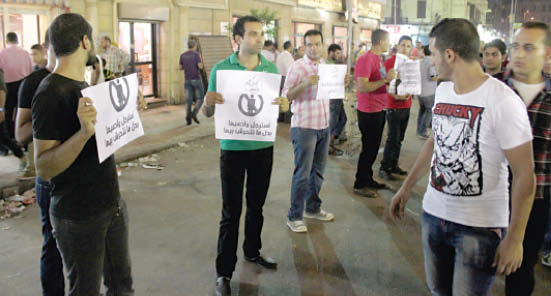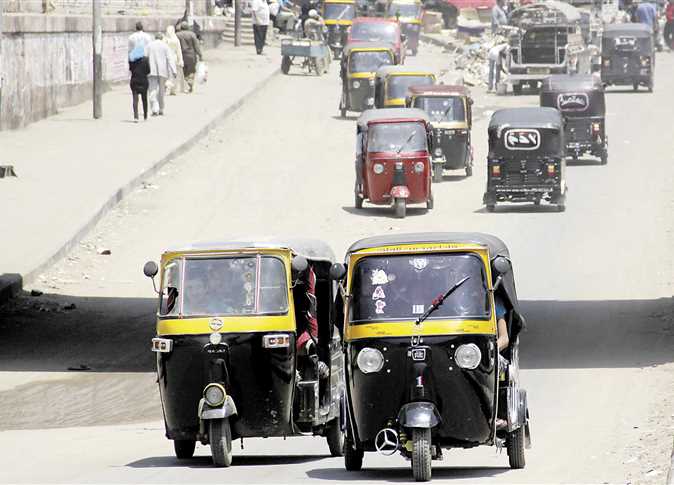
Since one of the country's first anti-sexual harassment protests in May, many men have taken part. To them, it seems logical to be involved. While some people are impressed, others are bemused by the involvement of men in campaigning against sexual harassment.
“It’s not a women’s issue, it’s a men’s problem,” says student Ahmed Salama, 21, when asked why he became involved. Fathi Farid also believes it’s a social issue.
“When, for the last few years, the typical Eid day out for young men is cinema, koshary and harassing girls, then you can say it has entered the social culture, and we all have a problem,” he says.
Having been involved in human rights work for several years, Farid has worked for Appropriate Communication Techniques (ACT) for the past year , which has campaigned for women’s rights for the last 22 years. He says he did not realize quite how severe the issues were until he started work with the organization. While trying to impress upon other men how the issue affects them, sometimes he talks about the economy. “The tourism sector is really important for Egypt. And not enough people realize that the experiences of foreign women here, along with photos of mass harassment during Eid, means a lot of people decide to go elsewhere.”
Other times, Farid’s approach is much more simple. “I just remind them we all have sisters and mothers.” Indeed, one of the ways that Ahmed started thinking about the issue of harassment was because his sister often asked him to accompany her on trips that had nothing to do with him because she felt uncomfortable. Another time, he went with a female friend to a police station to file a report about persistent phone harassment from a number. His friend was advised to change her number.
As Rebecca Chiao, co-founder of Harassmap put it, “most men have women in their lives.” Founded in 2010, Harassmap is an initiative using an SMS system for reporting incidences of sexual harassment. The SMS reporting code was donated to them by a man whose wife suffered from sexual harassment.
While the co-founders of Harassmap are all women, since the beginning Chiao says that half the volunteers have been men. “We didn’t target men specifically, it just happened. There are men and women out there who passionately feel that harassment has to stop.”
There are some, even among those who work on human rights, Farid points out, who ask why there is a focus on the issue of sexual harassment when there are far more important and pressing causes that must be dealt with. But, for the men involved, it is not just about sexual harassment, it’s about women’s freedom. If women cannot walk safely on the streets, what about the right to work, to education, to make independent decisions, and all their other rights, Farid asks. In a context of what he describes as “increased social conservatism and religious rhetoric that blame the woman,” he says it is particularly important to raise the issue of sexual harassment.
“Without women having their full rights, society cannot progress, and you cannot say that there has been a successful revolution,” argues Emad Zikri, a doctor who has been involved in campaigning for women’s rights for over five years. Because unemployment is high, men may be more likely to view increasing numbers of women entering the workforce with hostility. “But that is an economic issue,” Zikri says, “It is not a question of whether women should have the right to work. In the long-term we all benefit, men and women.”
Solidarity or protection
Arguably, men’s involvement is crucial, if campaigners do not want the issue to be seen simply as a women’s problem. Azza Kamel, long-time women’s rights activist, and founder and director of ACT, says, “We want men not just in solidarity, we want them as active participants.” She believes that when men and women are standing together making these arguments, they are more likely to be taken seriously. “Already we have men, and it is just the beginning,” she says.
Chiao explains that men are advantaged when it comes to the work of community outreach. “When it is just women, people are less responsive, largely because of the stereotype that women are hysterical. But when there is a man present, the group is more likely to be listened to.”
The role of men though, all these activists say, is one of equals. It is not uncommon to see groups of women protesters surrounded by a cordon of male protesters protecting them from harassment. A number of the men involved in activism against sexual harassment would refuse to be part of such a cordon. As Farid puts it, “I am not going to protect women, that’s what happens when you are patriarchal. I am going to fight next to women.” Similarly, Emad says, “If a woman does not think she has these rights, it is not for me to get them. Women have to liberate themselves, with our support.”
“Imagine,” says Farid, “I see a woman being harassed and I go fight with the guy. OK. But say she fights with him. As soon as I see that, I am by her side immediately. And, think of the effect. This guy feels like a man when he harasses a woman, so for him to be publicly humiliated by her, he won’t feel like a man, and maybe he won’t do it again.”
Just as not every man will make a positive contribution to campaigning, Kamel says, “the same is true for women.” In a 2010 survey carried out by the Population Council of young people’s attitudes in Egypt, 80 percent of males and 73 percent of females agreed that a woman who dressed provocatively deserved to be harassed. “Men and women are both part of the problem, and of the solution,” Kamel says.
What kind of man?
For many, it is not self-evident why men would be involved in such campaigns. For Farid, reactions range from “what does it have to do with you,” from both men and women, to suggestions that he is just doing it to get with women.
The two photo albums of anti-sexual harassment chains on the UN Women’s Facebook page have elicited many comments. There is both praise and criticism for the male participants. In one of the photos where a man is holding up a sign saying, “I shouldn’t have to accompany my sister everywhere,” some of the responses insult his sister. A typical way to insult a man in a sexist mindset is to insult his sister or his mother, and these kinds of comments attract responses from other users.
And, similar to the kind of reaction Farid regularly confronts, a photo of a man sporting a sign saying “I defend the right of every woman to walk in the streets safely” elicits a comment: “This guy is so smart, he’ll pick up some hot girls. I might try that trick tomorrow.” This kind of response emanates from what Farid says is “the logic of sexual harassment.”
Under the photo of a male participant who looks visibly poor, one man comments, “How much have you been paid?” Here the implication is that because he is poor, the man, rather than acting on principles, has been bought — an argument that mixes classism with sexism. Other comments show how the negative reactions to men are also mixed with homophobia. What is at stake in these often highly charged responses to the participation of men is what it means to be a man.
These comments are, in a sense, a debate about who is a real man, moving the focus away from the women and onto the group in society from which the perpetrators come. It may be, as Kamel says, that these men are “presenting a different model to other young men.” And if there are different ways of being a man, the message seems to be, then men have a choice, and can take responsibility.
This piece was originally published in Egypt Independent's weekly print edition.




